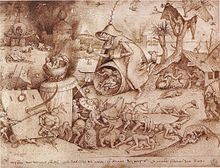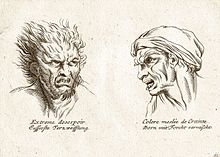anger


The anger ( latin ira ) is a basic state of strong emotional arousal ( affective ) with differently aggressive tendency associated partly with vegetative side effects (see FIG. Anger ).
The term already exists in Middle High German / Old High German anger ; west germanic turna . The word has been used since the 9th century .
More precise definition
On the one hand, it occurs as a violent anger , anger- like affect , a sudden rage or an outburst of anger that can lead to uncontrolled actions or words. Anger then appears as the ruler of the human being, who in turn no longer controls his emotions. On the other hand, occurs as anger continued, just appearing "anger" on (as resentment , obsolete Grimm or more anger designates). Known forms are Bauer anger , citizens anger , popular anger , selector anger ; Gods anger , wrath of God .
Anger is therefore more likely to ignite wrongly or unjustly perceived behavior or circumstances, with the aim of changing them or manipulating them according to one's own views or needs, while anger is felt more general and dull and can explode uncontrollably in all directions.
In contrast to anger, anger is preceded by an insult (such as deeply unjust treatment) that psychologically feeds the state of agitation aimed at retribution or satisfaction. In the case of anger, on the other hand, the excitement is fed by the denial of a claim or need (such as the angry child who was not given a candy; angry parents who were denied respect; people who are angry about circumstances or plans). The aim here is less retaliation than the clear expression of displeasure and dissatisfaction. Another state of excitement is the indignation that a violation z. B. against general morality gives rise to an emotional reaction.
Aristotle counts anger among his eleven basic emotions ; according to the American psychologist Paul Ekman (* 1934) it belongs to the family of expressions of anger ; According to Caroll Izard (* 1924) this is one of ten basic emotions . As a qualification, it must be mentioned that the concept of basic emotions is controversial in psychological research and there is no agreement as to how many and which emotions are fundamental and why they should be. Here, instead of anger, the same meaning is used to refer to anger or anger .
Holy anger is a special form . The latter is righteous anger over something clearly unjust. Holy anger is not directed against people. Ideally, it leads to not only being angry about an unjust cause, but also to working to eliminate it. To name them clearly, to take action and to act compassionately or to induce others to act. So holy anger can be valuable because it releases energies that can help make a difference. Anger is converted into positive energy in holy anger. This is what sets him apart from his everyday brother.
Cultural history
In the Iliad of Homer 's anger is Achill an important motive. The real basic mood of Achilles, however, is achos (Greek ἄχος), the pressing, agonizing pain.
Laktanz gives a special role in his work De ira dei the wrath of God . In contrast to the distant and dispassionate gods in Epicurus and the Stoa , the anger of the Christian God, who punishes and threats, is a prerequisite for fear of God, which in turn is a prerequisite for all religion. According to Laktanz, religion is the basis of wisdom and justice ( De ira dei , 12). God would not be the guarantor of the good world order either if he were not angry about the wrongdoings of evil people.
In Christian theology, anger is one of the "seven main vices ". He is represented allegorically in Western art.
literature
- Seneca , Über den Zorn (De ira), Goldmann Taschenbuch 1391, Goldmann, Munich [1963], ISBN 3-442-01391-7 .
- Lactantius , De ira dei
- Ronald Britton, Michael Feldman, John Steiner: Resentment and Vengeance in the Oedipal Situation. Contributions to the Westlodge Conference 1995 . Edition diskord, Tübingen 1997, ISBN 3-89295-617-0 .
- Jürgen Werner, The Seven Deadly Sins. Insights into the depths of human passion , Stuttgart 1999 (zum Zorn: pp. 47–69), ISBN 3-421-05278-6
- Peter Sloterdijk , Zorn und Zeit , Suhrkamp, Frankfurt am Main 2006, ISBN 3-518-41840-8 ( review by Johannes F. Lehmann, in: Iasl-Online, January 17, 2007 )
- Eva-Maria Engelen , A Brief History of “Anger” and “Shame” , Archive for Conceptual History 50, 2008.
- Johannes F. Lehmann, In the abyss of anger. On the cultural and literary history of Zorns , Rombach, Freiburg im Breisgau 2012, ISBN 978-3-7930-9690-0 (habilitation thesis)
- Bozena Anna Badura , Kathrin Weber (eds.): Ira - Wut und Zorn in Kultur und Literatur , Psychosozial-Verlag, Giessen 2013, ISBN 978-3-8379-2224-0 .
- Evamaria Freienhofer: Embodiments of rule: anger and power in texts of the 12th century (= Trends in medieval philology , Volume 32), De Gruyter, Berlin 2016, ISBN 978-3-11-047083-3 (Dissertation FU Berlin 2012, 218 Pages).
- Pankaj Mishra : The Age of Anger. A story of the present . S. Fischer, 2017, ISBN 978-3-10-397265-8 .
See also
Web links
- Reinhard von Bendemann: Wrath of God (NT). In: Michaela Bauks, Klaus Koenen, Stefan Alkier (Eds.): The Scientific Bibellexicon on the Internet (WiBiLex), Stuttgart 2006 ff., Accessed on January 27, 2013.
Single receipts
- ^ William J. Hoye: The basic structures of the good person after Josef Pieper. (PDF, 106 kB) The four cardinal virtues. In: Knowledge and Wisdom. Two symposia in honor of Josef Pieper (1904–1997). H. Fechtrup, F. Schulze u. T. Sternberg (Documentation of the Josef Pieper Foundation, Vol. 6) (Münster), 2005, pp. 173 - 197 , accessed on April 21, 2014 : “The brave is by no means tired of life or callous. On the contrary: a just anger may even be morally imperative, and its absence would be reprehensible. "
- ^ Paul Ekman: An Argument for Basic Emotions . (1992)
- ^ NDR: Das Kirchenlexikon - Heiliger Zorn. Retrieved October 21, 2017 .
- ^ University of Duisburg, Essen 2011 566 pages.
- ↑ Interview on the book: "The desire for destruction is part of modern societies"
